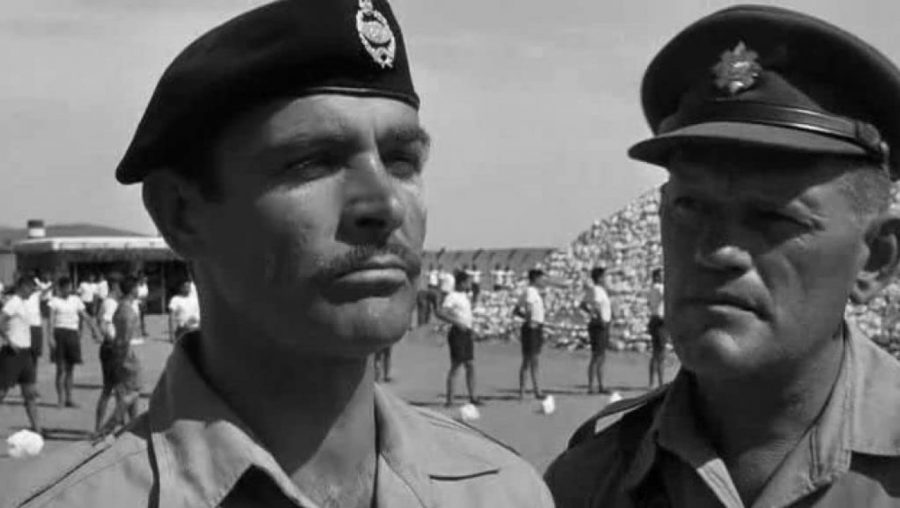Hidden Gem: “The Hill” (1965)
Sean Connery and Harry Andrews star in “The Hill.” The film was released in 1965.
November 10, 2020
The recent passing of Sean Connery made me fondly recall several of the non-007 roles he played between the time he was James Bond in seven films from 1962 t0 1983. In 1964, Connery was selected by Alfred Hitchcock to star in the romantic mystery “Marnie.” The 1966 oddly amusing comedy “A Fine Madness” was followed by the 1971 taut caper film “The Anderson Tapes.” Add to this list this week’s hidden gem, director Sidney Lumet’s brutal World War II prison drama “The Hill” from 1965.
This almost forgotten black and white film featured Connery as Sergeant Major Joe Roberts, one of a group of soldiers who arrive in a small desert prison camp in Libya. Unlike the conventional Hollywood wartime prison films, like “Stalag 17” and “The Great Escape,” which featured evil Nazi captors, “The Hill” concerns English soldiers in a British run military prison camp, where numerous brutalities are inflicted on the prisoners by their commanders.
The film was scripted by Ray Rigby, loosely based on his experiences in the British army. “The Hill” would be the first of five films Connery would make with Lumet over the next 25 years.
This grim and starkly bleak tale was so unlike the flashy Bond films, hardly any Connery fans and filmgoers went to this film. It features a fine ensemble cast of British screen veterans Harry Andrews, Ian Bannen, Ian Hendry, Sir Michael Redgrave and American Ozzie Davis. Rigby’s screenplay also won the title of Best Screenplay at the Cannes Film Festival in 1966.
The film’s focus is mostly on five new prisoners, all charged with a variety of dereliction of duty, thievery and other insubordinations. Privates Jock McGrath (Jack Watson), Jacko King (Ozzie Davis), Monty Bartlett (Roy Kinnear), George Stevens (Alfred Lynch) and trooper Joe Roberts (Connery) are quickly introduced to the brutal Sergeant Major Wilson (Harry Andrews). He is the camp’s enforcer, who demands strict obedience and everything done “on the double.”
Get The Daily Illini in your inbox!
Connery’s Roberts is charged with assaulting a commanding officer after rejecting an order to lead his men in a suicidal attack. Wilson takes a particular interest in reforming Roberts. After each prisoner is given a superficial medical exam by the camp medical officer (Redgrave), Wilson inflicts some of his strictest punishment. The prisoners climb the camp’s 40-foot hill of sand and stone in the blistering heat and sun. The men usually carry heavy backpacks and wind up collapsing due to exhaustion. On the first afternoon, Roberts must complete several more laps on the hill and is denied his evening grub.
In Maura Spiegel’s recent Lumet biography, she notes, “The film exposes the demeaning cruelty and physical sadism to which men are subjected and the absolute power over others, sometimes placed in the hands of brutal or stupid men.” Lumet has said his film is “about the hopelessness of fighting authority for anything other than your own conscience.”
Adding to the film’s initial intensity, cinematographer Oswald Morris shoots most of the film with a realistic handheld camera, in nearly constant motion, utilizing natural light sources and intense close-ups, especially during many prisoners’ interrogations. Lumet uses many high angle shots looking down on the soldiers as they struggle up the hill, then effectively enhances their anxiety with spontaneous camera movements with closer framing options.
Connery is always believable as a rough rebel challenging the loud sadistic staff Sergeant Williams (Hendry) who vows to break Roberts. Roberts becomes the protector of his cell block buddies, especially Private Stevens, who is about to have an emotional breakdown. Roberts eventually leads a near mutiny of the prisoners when Stevens dies, and everyone knows it’s Williams’s fault. Roberts even convinces the more reasonable Sgt. Harris (Bannen) to speak up for his cellmates from their excessive abuses.
Undoubtedly the film’s less than conventional Hollywood ending hurt the movie at the box office. Despite that, Lumet’s “The Hill” is a fine, overlooked tribute to the entertaining legacy of screen legend Sean Connery.







